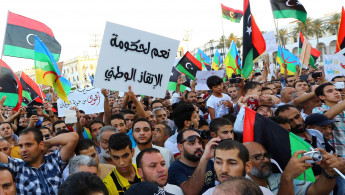Court ruling fails to stop Libya tearing itself apart
Court ruling fails to stop Libya tearing itself apart
Supreme Court rules internationally recognised elected parliament to be unconstitutional, as well as its government in eastern Libya and rebel General Haftar's 'Operation Dignity'.
2 min read
The elected government remains popular in the east [Anadolu]
Last week, Libya's Supreme Court ruled the country's elected parliament unconstitutional. It was a ruling that has done little to stop the country tearing itself apart.
The court's Constitutional Chamber ruled that a legal amendment that facilitated the June election of the House of Representatives was itself unconstitutional - and therefore, by extension, the election, the subsequent parliament and its "National Salvation Government" were all unconstitutional.
"I hope all parties will respect the decision of the court," said Islamist politician Abderrauf al-Manai, who is boycotting the internationally recognised parliament, which now sits in the eastern city of Tobruk after violence forced it from the capital, Tripoli.
The former Islamist-dominated parliament has reformed and now sits in Tripoli as "The General National Congress" - a rival power structure.
The Tobruk-based House of Representatives has discounted the Supreme Court decision, alleging the court could not act independently - as Tripoli is controlled by armed Islamist militias allied to the General National Congress.
"The House of Representatives rejects the verdict under these conditions and says it is still functioning, as is the government," said Tobruk parliamentarian Adam Abu Sakhra.
Has Haftar's gambit failed?
The election of the House of Representatives was forced by Khalifa Haftar, a rogue general who rebelled in February after the former parliament unilaterally extended its own mandate.
In May, he launched "Operation Dignity", a large military offensive, which has since fought "Operation Libya Dawn" - an alliance of Islamist-linked militias.
The elected parliament was recognised internationally and supported by other Arab states, notably Egypt and the United Arab Emirates, who oppose the Islamists in Libya.
The Supreme Court ruling leaves Haftar's military operation without any constitutional justification. However, political observers expect the verdict will not make much of a difference on the ground, as Haftar's forces continue their operation against Islamist fighters in Benghazi and other cities in eastern Libya.
According to sources in Benghazi, Haftar's forces are besieging the city, bombing neighbourhoods controlled by the fighters of the Shura Council of Benghazi Revolutionaries.
Thus far, 200 of the council's fighters have reportedly been killed and 300 are thought to have been injured. They have not been reinforced or resupplied during the siege, and they may not be able to hold out for much longer.
This is an edited translation from our Arabic edition.
The court's Constitutional Chamber ruled that a legal amendment that facilitated the June election of the House of Representatives was itself unconstitutional - and therefore, by extension, the election, the subsequent parliament and its "National Salvation Government" were all unconstitutional.
"I hope all parties will respect the decision of the court," said Islamist politician Abderrauf al-Manai, who is boycotting the internationally recognised parliament, which now sits in the eastern city of Tobruk after violence forced it from the capital, Tripoli.
The former Islamist-dominated parliament has reformed and now sits in Tripoli as "The General National Congress" - a rival power structure.
The Tobruk-based House of Representatives has discounted the Supreme Court decision, alleging the court could not act independently - as Tripoli is controlled by armed Islamist militias allied to the General National Congress.
"The House of Representatives rejects the verdict under these conditions and says it is still functioning, as is the government," said Tobruk parliamentarian Adam Abu Sakhra.
Has Haftar's gambit failed?
The election of the House of Representatives was forced by Khalifa Haftar, a rogue general who rebelled in February after the former parliament unilaterally extended its own mandate.
In May, he launched "Operation Dignity", a large military offensive, which has since fought "Operation Libya Dawn" - an alliance of Islamist-linked militias.
| The House of Representatives rejects the verdict under these conditions and says it is still functioning, as is the government. - Adam Abu Sakhra, parliamentarian |
The elected parliament was recognised internationally and supported by other Arab states, notably Egypt and the United Arab Emirates, who oppose the Islamists in Libya.
The Supreme Court ruling leaves Haftar's military operation without any constitutional justification. However, political observers expect the verdict will not make much of a difference on the ground, as Haftar's forces continue their operation against Islamist fighters in Benghazi and other cities in eastern Libya.
According to sources in Benghazi, Haftar's forces are besieging the city, bombing neighbourhoods controlled by the fighters of the Shura Council of Benghazi Revolutionaries.
Thus far, 200 of the council's fighters have reportedly been killed and 300 are thought to have been injured. They have not been reinforced or resupplied during the siege, and they may not be able to hold out for much longer.
This is an edited translation from our Arabic edition.



